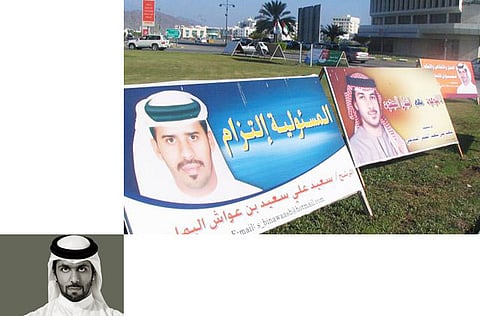Take Two: The FNC elections
A council member can oversee performance of federal government

Five years on, the UAE is holding its second elections for its Federal National Council (FNC). The electoral college's cumulative number i.e. people eligible to vote has increased from 6,595 in 2006 to 129,274 in 2011. What has also been notable is the emphasis on youth; last week Gulf News reported that 74% of voters are below 40.
But beyond numbers and ratios the question remains, considering that the FNC remains a council with no real legislative powers or substantive oversight, what does its ‘gradual' transformation from a council of appointees to an electable one signify? In other words, why bother? As the UAE grows, equitable representation of grievances, aspirations and issues in general become more complex. The Majlis, the Emirates' traditional un-bureaucratic courts must be revisited. Communication between people and government has never been more challenging.
And so it is in that light representation of diverse views is important. After all, an appointed FNC member's criticality reflects on his or her Emirate's Ruler and their relationship; some have been able to use it as a launch pad to ask members of federal governments tough questions and some have refrained from doing so.
An elected member draws his legitimacy not from regal appointment but from the representation of his or her constituency. An elected member will also carry socio-economic issues that aren't always brought in context of proposed constitutional amendments and legislations. While learning about the election itself, I had to stop and ask myself: what does the FNC do? The FNC primarily plays two roles: a legislative (read advisory) role and a supervisory one.
Review and supervision
With legislation, the FNC reviews, comments on four things: Constitutional amendments; Proposed legislations; public budget and its closing account and agreements and treaties
While the first is proposed by the Supreme Council (of the seven rulers) and then shared with FNC before it reaches the Cabinet, the remaining originates from the Cabinet, pit stop at the FNC and make their way to the Supreme Council. Either way, the FNC's role in all of the above is to review and register its comments.
With supervision, the FNC does three things: General issues: an inquiry into the federal policy towards a specific issue. It must be raised by a minimum of five FNC members; Questions: specific questions raised by an FNC member to the prime minister or a specific minister and Complaints: received by the FNC in relation to federal affairs from citizens. There are two points worth criticising regarding the current election process. First is the extremely tight schedule where registration of candidates begins mid- August and their announcement at the end of it. The campaigning begins early September, presumably during or right after the Eid break, with the adoption of the final list at the end of that month — or first week of October should there be candidates that have polled an equal number of votes. This strikes me as extremely hurried especially when the deadline crosses over Ramadan and Eid. Considering the large expansion of the Electoral College, I would've expected that more time would've been given for voters and campaigners to ‘discover' each other.
Second is the membership of the National Election Committee (NEC). Out of its 13 members, only 3 are independents — the remaining 10 hold senior posts in the federal government. While the UAE is a country of a strong and interconnected social fabric, the NEC should've been more evenly weighed between independents and civil servants.
Constructive relationship
Nevertheless, I do hope that the campaign will present us with new voices of constructively critical patriots.
I've recently argued that granting the FNC legislative powers at this critical phase in the UAE's history could potentially transform it into a populist council that would expand the welfare state to unprecedented levels. This is especially a source of concern when we remain significantly dependent on oil — and oil dependent industries — as a major contributor to our GDP. This is not to say that it shouldn't be the FNC's role to legislate one day. Quite the opposite, having an FNC with legislative powers is both inevitable and necessary; it is only a question of institutionalisation and timing.
The question all candidates must ask themselves is this: If I can't legislate and my review of proposals isn't by any means binding, what could I do there?
Until that day comes, I think the most effective role an FNC member can play is provide oversight on the performance of the federal government on behalf of the constituents. From where we are in our relationship with Brazil to how fast the upgrade of that hospital in Umm Al Quwain is coming along. They should not only ask tough questions but also work with the government for the UAE's general well being, proposing ideas just as much raising concerns about achievements. Equally, members of the federal government should maintain a constructive relationship with the FNC. After all, it collectively represents those whom the federal government is meant to serve.
Mishaal Al Gergawi is an Emirati current affairs commentator.


